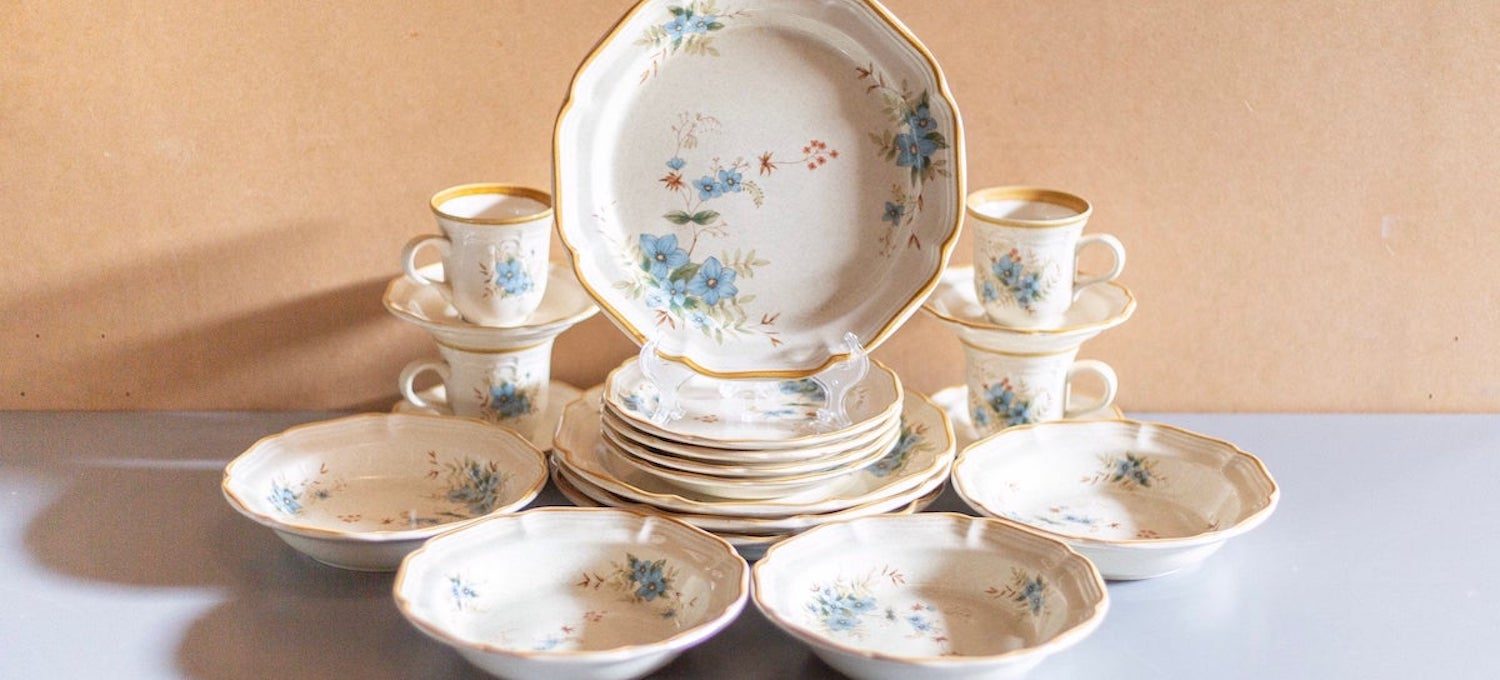We love vintage like nobody’s business. To that end, we’re talking to some of our very favorite vintage sellers on how they get the job done — with a tour of a few of their best pieces. We kick off the series with Thies Powell of Thies Powell Vintage — in particular a one-stop shop for some really exceptional dining and serveware.
Shop: Thies Powell Vintage
Location: Coeur d’Alene, Idaho
Our pick: This vintage oil painting
How would you describe your shop’s vibe?
The intent for my vintage products is always that they be useful and integrate seamlessly into modern environments. To that end, I always want my shop to feel warm, comforting, a little utilitarian, a tiny bit “high street” — a place you’d want to be, if it were a brick-and-mortar shop. I guess the vibe there is comfort and desire, like a good dessert.

What’s the best thing you’ve ever found while buying for your shop? Did you keep it for yourself or sell it?
Though many find this hard to believe, I’m not at all a collector. I see vintage items very much as moving forward and less about looking back. It makes me most happy when my guests send me photos of their kids baking a cake and using a beautiful glass stand and cloche rather than displaying it on a shelf. I haven’t kept one yet. But there are always a few items that leave a little pang in my heart when they are shipped. I recently sent an antique wicker laundry basket to Buenos Aires and found myself a little sad to see it go.

Is vintage your full-time job or do you do other sorts of work as well?
Vintage is my full time job, sort of. I’m a professional photographer working in fine art and portraiture, and my background is 22 years of sales and marketing. So I earn my living with vintage primarily, but I do take on some portrait work and will do some vintage consulting in the upcoming year.

What makes vintage pieces where you’re from special?
That’s a difficult question to answer! I grew up in North Idaho but only returned here in 2017 after 25 years away in France, North Carolina, and Colorado. I find all kinds of things that have journeyed here from all over the world. What makes them special is that they have a useful past. What makes them exciting is how all of that history can still be relevant and functional today and hopefully decades from now.

I read in your bio that you look at hundreds of pieces daily. Where?? It’s what anyone would see when they shop as much as I do. Aside from online shopping, recommendations, contacts, vintage markets, etc., I go through about 25 thrift stores between four towns weekly. And though I don’t necessarily buy every day, I shop nearly every single day. I always remark that I don’t deal in the rare, collectible or unusual — but I’m in love with the good. Good design, proven function, good materials, and good execution. You’ll find pieces of the sets I sell in nearly any thrift store around the country. But you’ll rarely find all of it. That’s why I shop every day.
This may be a different topic entirely, but I want to note that vintage sellers tend to treat thrift stores as wholesale houses. People take things to the Humane Society, Hospice, Good Samaritan, or others because they offer a cause the donors want to support. We then go in and rave about what we found — what a great score we got, how cheap it was, etc. We don’t often consider what they are there for: to support their cause. My mom died in April of this year, and if it hadn’t been for hospice care, we would have been completely and utterly lost.
It occurred to me very early on that I couldn’t do this without them, and so I started giving back. I see them every day, they know who I am and what I do. I volunteer three hours a week at one store. Others I have helped merchandise their shelves or made recommendations when asked. They are sort of my internal clients, and I take care of them. I never ask for a discount (they are there to raise money for their cause, not to provide me with income). I regularly pass up items that I think they will sell quickly versus the item sitting in my shop for two months — and I make sure to let them know that they can approach me if they need to. I don’t brag about how much more an item will sell for [in my shop than in a thrift store]. These stores aren’t dumb. They understand what sells. But they aren’t running a museum. Selling quickly allows them to put more merchandise out and move things. I bring them extra bags or packing materials, items I was gifted or were part of a lot that I know won’t fit well into my collection.
Spread the wealth. Share your time. Help support their causes, whether you agree with them or not. Believe me, they will take care of you tenfold.
See more from Thies Powell Vintage here. And see our favorite French flea market pieces here.
